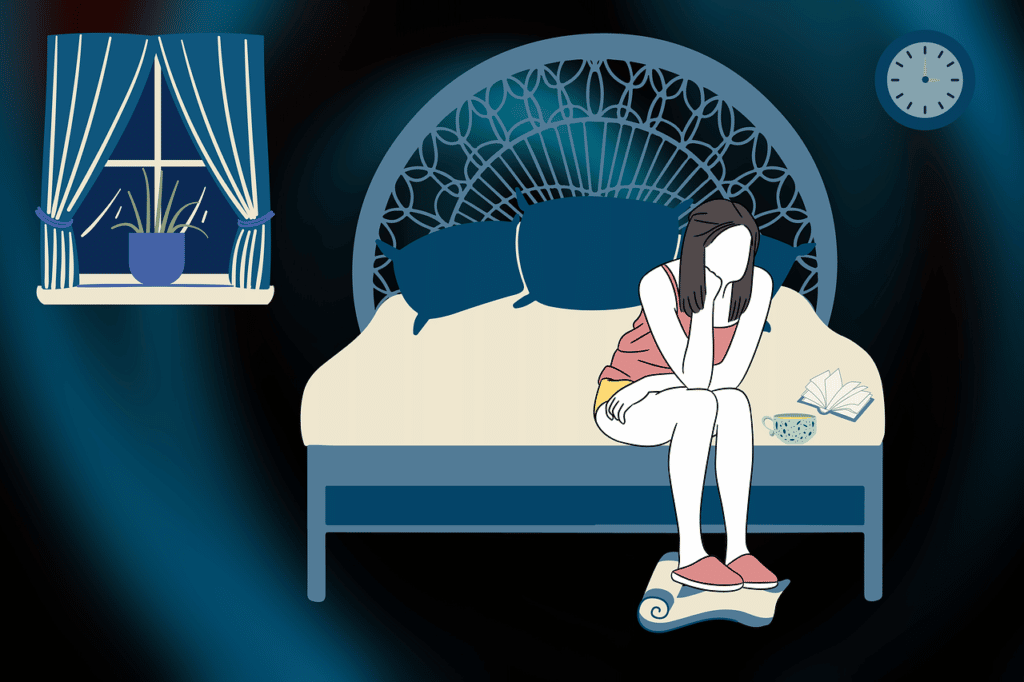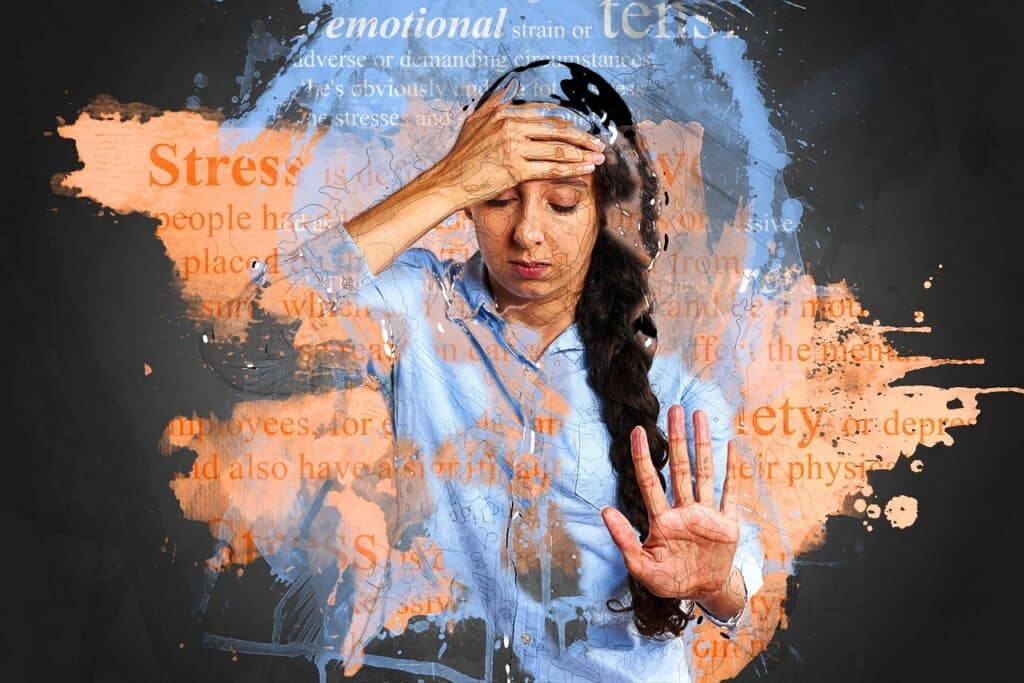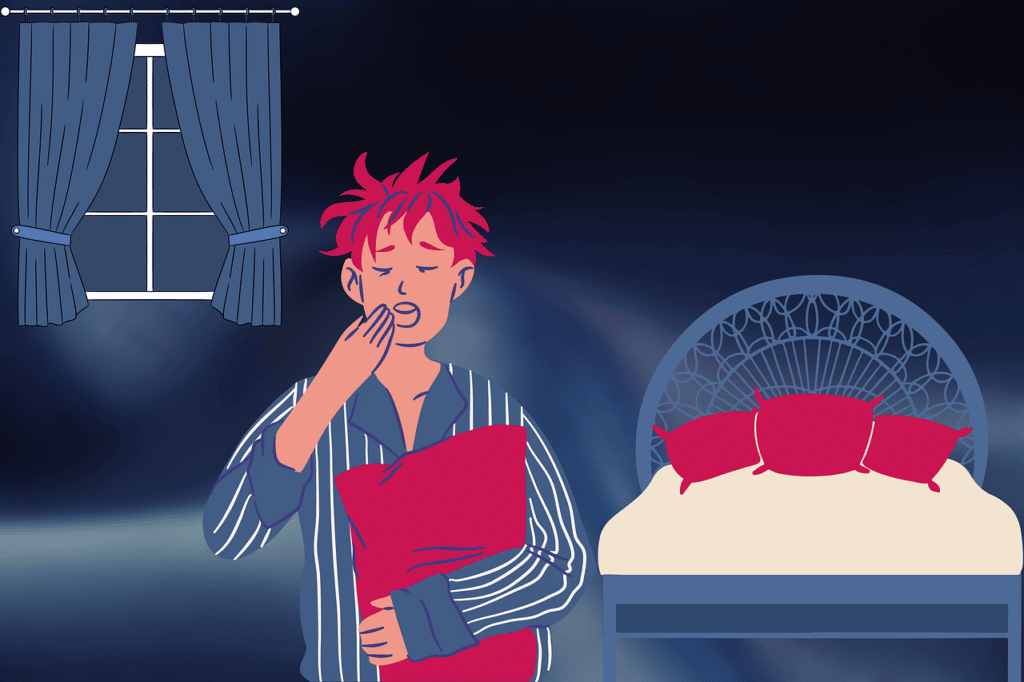
Insomnia is a sleep disorder characterized by difficulty falling asleep, staying asleep, or both. Anxiety is a feeling of worry, nervousness, or unease about something with an uncertain outcome. Insomnia and anxiety can be related, as anxiety can make it difficult to fall asleep and insomnia can increase feelings of anxiety. Treatment for insomnia and anxiety often includes a combination of medication, therapy, and lifestyle changes.
Insomnia is a common sleep disorder that can be caused by a variety of factors, including stress, anxiety, depression, chronic pain, and certain medications. Symptoms of insomnia include difficulty falling asleep, staying asleep, or both, as well as feeling tired or groggy during the day.
Chronic insomnia can lead to a number of negative consequences, such as decreased productivity, irritability, and an increased risk of accidents.

Anxiety is a general term that refers to a variety of mental health conditions characterized by feelings of worry, nervousness, or unease about something with an uncertain outcome.
Anxiety disorders are the most common mental health disorders in the United States and can manifest in a number of ways, such as generalized anxiety disorder, panic disorder, social anxiety disorder, and specific phobias. Symptoms of anxiety can include excessive worrying, restlessness, fatigue, irritability, and difficulty concentrating.
Insomnia and anxiety are closely related and often occur together. Anxiety can make it difficult to fall asleep and insomnia can increase feelings of anxiety.
Treatment for insomnia and anxiety often includes a combination of medication, therapy, and lifestyle changes. Medications commonly used to treat insomnia include sedatives and non-benzodiazepine hypnotics, while medications commonly used to treat anxiety include antidepressants, beta blockers and anti-anxiety medications.
Therapy, such as cognitive behavioral therapy (CBT) can help address the underlying causes of insomnia and anxiety and teach patients strategies for managing their symptoms. Lifestyle changes such as regular exercise, avoiding caffeine, nicotine and alcohol, and maintaining a consistent sleep schedule can also be helpful in managing insomnia and anxiety.
Causes of Insomnia

Insomnia can be caused by a variety of factors, including:
- Psychological factors: Stress, anxiety, and depression are common causes of insomnia. These conditions can make it difficult to fall asleep and stay asleep.
- Medical conditions: Chronic pain, asthma, and certain medical conditions such as Parkinson’s disease and acid reflux can lead to insomnia.
- Medications: Certain medications, such as antidepressants, beta blockers, and stimulants, can cause insomnia as a side effect.
- Environmental factors: Noise, light, and temperature can all disrupt sleep. Shift work, jet lag and time zone changes can also make it difficult to fall asleep.
- Lifestyle factors: Caffeine, nicotine, and alcohol can all interfere with sleep. Late-night eating and irregular sleep schedules can also contribute to insomnia.
- Sleep disorders: Certain sleep disorders, such as sleep apnea, can cause insomnia.
It’s important to note that insomnia can also have no apparent cause, this type is referred as primary insomnia. Insomnia can also be associated with other disorders such as PTSD, bipolar disorder and schizophrenia. A comprehensive evaluation by a doctor or a sleep specialist is recommended to identify the cause of insomnia and to determine the best course of treatment.
Symptoms of Insomnia
Symptoms of insomnia include:
- Difficulty falling asleep: Having trouble falling asleep at night, even when you’re tired.
- Difficulty staying asleep: Waking up frequently during the night and having trouble returning to sleep.
- Early morning awakening: Waking up earlier than desired and being unable to fall back asleep.
- Non-restorative sleep: Feeling tired or groggy even after a full night’s sleep.
- Difficulty concentrating: Having trouble focusing on tasks during the day due to sleepiness.
- Irritability: Feeling short-tempered or easily agitated due to lack of sleep.
- Depression or anxiety: Insomnia can be a symptom of depression or anxiety, and it can also make these conditions worse.
- Lack of energy: Feeling fatigued or lacking energy during the day.
- Physical symptoms: Headaches, muscle aches, and gastrointestinal problems can all be caused by insomnia.
These symptoms can vary depending on the type of insomnia and the individual. A comprehensive evaluation by a doctor or a sleep specialist is recommended to identify the symptoms of insomnia and to determine the best course of treatment.
How to Manage Insomnia
Insomnia can be managed in several ways, including:
- Sleep hygiene: Establishing a regular sleep schedule, avoiding caffeine and alcohol before bedtime, and creating a relaxing bedtime routine can help improve sleep.
- Cognitive behavioral therapy for insomnia (CBT-I): CBT-I is a form of therapy that helps you change thoughts and behaviors that are contributing to insomnia.
- Medication: Short-term use of sleeping pills can be helpful for those with acute insomnia. However, long-term use is not recommended.
- Exercise: Regular physical activity can help improve sleep, but it’s important to finish exercising at least a few hours before bedtime.
- Relaxation techniques: Techniques such as deep breathing, progressive muscle relaxation, and mindfulness meditation can help you relax and improve sleep.
It’s important to find the treatment that works best for you. A combination of sleep hygiene, therapy, and medication may be necessary for effective management of insomnia. It’s also important to remember that the process of managing insomnia is often a journey, and it can take time to find the right combination of treatments.
Causes of Anxiety
Anxiety can be caused by a variety of factors, including:
- Genetics: Anxiety disorders often run in families and may be caused by inherited genetic vulnerabilities.
- Trauma: Traumatic events, such as physical or emotional abuse, can increase the risk of developing anxiety disorders.
- Brain chemistry: Imbalances in certain chemicals in the brain can contribute to anxiety.
- Medical conditions: Certain medical conditions, such as thyroid imbalances, can cause anxiety symptoms.
- Substance abuse: Substance abuse or withdrawal can cause anxiety symptoms.
- Life events: Stressful life events, such as the death of a loved one, a divorce, or a job loss, can trigger anxiety disorders.
- Chronic stress: Long-term stress can increase the risk of developing anxiety disorders.
It’s important to note that the causes of anxiety disorders are often complex and may involve a combination of factors.
A comprehensive evaluation by a mental health professional is recommended to identify the cause of anxiety and to determine the best course of treatment.
Symptoms of Anxiety
Symptoms of anxiety can include:
- Excessive worry: Constant and excessive worry or fear about everyday situations.
- Restlessness: Feeling restless or on edge.
- Fatigue: Feeling tired or exhausted, even after getting enough sleep.
- Irritability: Feeling short-tempered or easily agitated.
- Difficulty concentrating: Having trouble focusing on tasks.
- Muscle tension: Tension in the muscles, such as jaw clenching, shoulder stiffness, or headaches.
- Sleep disturbance: Having trouble falling asleep or staying asleep, or experiencing nightmares.
- Nausea: Feeling sick to your stomach, especially in social situations.
- Rapid heart rate: A fast or pounding heart rate, especially in response to stress.
- Shortness of breath: Feeling short of breath or having difficulty breathing.
- Sweating: Sweating excessively, especially in response to stress.
It’s important to note that these symptoms can vary depending on the individual and the type of anxiety disorder. A comprehensive evaluation by a mental health professional is recommended to identify the symptoms of anxiety and to determine the best course of treatment.
How to Manage Anxiety
Anxiety can be managed in several ways, including:
- Therapy: Talking to a mental health professional can help you learn coping strategies and develop techniques for managing anxiety. Cognitive behavioral therapy (CBT) is a popular form of therapy for anxiety disorders.
- Medication: Anti-anxiety medications, such as benzodiazepines and selective serotonin reuptake inhibitors (SSRIs), can be prescribed by a doctor to help manage symptoms of anxiety.
- Lifestyle changes: Making changes to your lifestyle can help reduce stress and manage anxiety. This may include exercise, healthy eating, and avoiding caffeine, alcohol, and nicotine.
- Relaxation techniques: Techniques such as deep breathing, progressive muscle relaxation, and mindfulness meditation can help you manage anxiety in the moment.
- Support: Talking to friends and family about your anxiety can provide you with support and help you feel less isolated. Joining a support group can also be beneficial.
It’s important to find the treatment that works best for you. A combination of therapy, medication, and lifestyle changes may be necessary for effective management of anxiety. It’s also important to remember that the process of managing anxiety is often a journey, and it can take time to find the right combination of treatments.
Conclusion
In conclusion, both insomnia and anxiety are common conditions that can impact a person’s quality of life. The causes of each condition can vary, but they can be managed through a combination of therapy, medication, lifestyle changes, and relaxation techniques.
It’s important to seek help from a doctor or mental health professional to determine the best course of treatment for your specific symptoms. Finding the right combination of treatments may take time, but it can lead to improved sleep and reduced anxiety. By taking a proactive approach to managing insomnia and anxiety, you can improve your overall well-being and lead a happier, healthier life.

